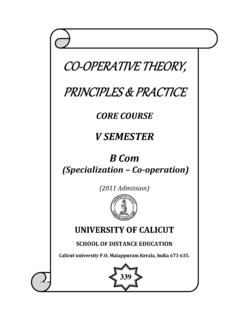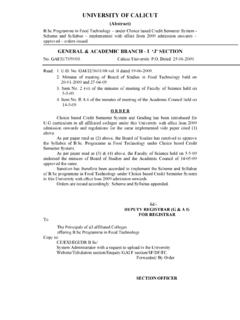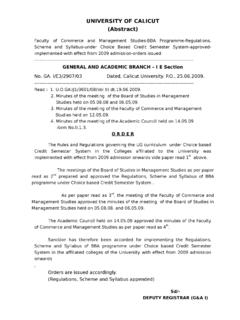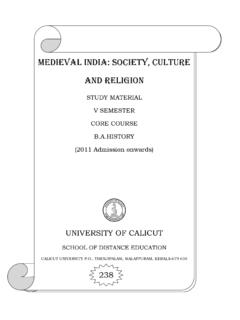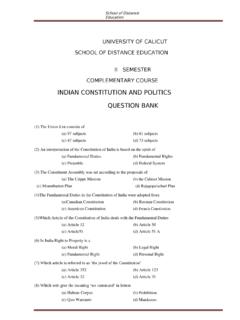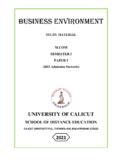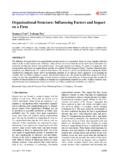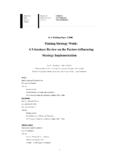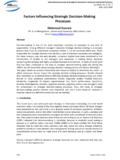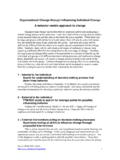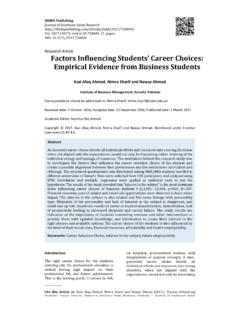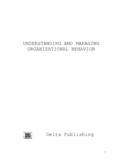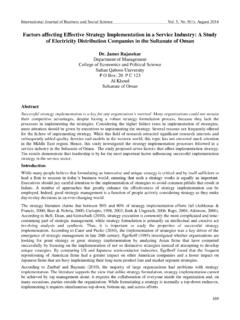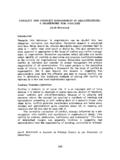Transcription of ORGANIZATIONAL THEORY AND BEHAVIOUR - …
1 ORGANIZATIONAL THEORYAND BEHAVIOURSTUDY MATERIALMASTER OF COMMERCEP aperMC1C52015 AdmissionUNIVERSITY OF CALICUTSCHOOL OF DISTANCE EDUCATIONCALICUT UNIVERSITY , THENJIPALAM, MALAPPURAM-6736352025 School of Distance EducationOrganizational THEORY and behaviourPage2 UNIVERSITY OF CALICUTSCHOOL OF DISTANCE EDUCATIONSTUDY MATERIALI THEORY AND BEHAVIOURPREPARED PROFESSORPG DEPARTMENT OF COMMERCEGOVT. COLLEGE MALAPPURAMSCRUTINISED BYDR. YAKOOB . AND RESEARCH GUIDE,SS COLLEGE, & Lay out:Computer Section, SDE ReservedSchool of Distance EducationOrganizational THEORY and behaviourPage3 MODULEName of ChapterPage TO ORGANISATIONALBEHAVIOUR52 NATURE AND SCOPE (FEATURES)
2 OFORGANIZATIONAL BEHAVIOUR83 ORGANISATION AS A SYSTEM154 MANAGERIAL FUNCTIONS195 BASIC PSYCHOLOGICAL PROCESS-PERCEPTION236 ATTRIBUTION IN ORGANIZATIONS287 LEARNING308 IMPLICATIONS FOR PERFORMANCE ANDSATISFACTION369 MOTIVATIONAL OF MOTIVATION4211 PERSONALITY6412 PERSONALITY THEORIES7013 MAJOR PERSONALITY ATTRIBUTES INFLUENCINGORGANISATION BEHAVIOUR7314 ATTITUDES7615 ETHICAL ISSUES IN ORGANISATIONAL BEHAVIOUR8216 ROLE OF COUNSELING8617 GROUP DYNAMICS AND INTER GROUP RELATIONSHIPS9118 GROUP DYNAMICS9919 TEAM MANAGEMENT-MEANING AND CONCEPT10820 LEADERSHIP AND COMMUNICATION1142122 RECENT APPRAOCHES TO LEADERSHIP THEORIES13123 COMMUNICATION13424 POWER AND POLITICS IN ORGANISATIONS14525 MANAGING CHANGE15826 ORGANISATIONAL DEVELOPMENT17327 TRANSACTIONAL ANALYSIS180 School of Distance EducationOrganizational THEORY and behaviourPage4 School of Distance EducationOrganizational THEORY and behaviourPage5 MODULE 1 UNIT 1 INTRODUCTION TO ORGANISATIONALBEHAVIOURThe success of every organisation depends upon the efficiency and effectiveness of themanagement and the effectiveness of the management depends primarily on its human skills andhow well
3 It understands the needs and desires of the people .Organisational BEHAVIOUR actuallyrefers to the BEHAVIOUR of the people in the organisations because organisations themselves do notbehave .It is an accepted fact that an organisation can develop only when its people are BEHAVIOUR is a field of study that investigates the impact that individuals, groupand structure have on BEHAVIOUR within organisations. It covers three determinants of behaviourwithin organisations individuals , group and structure. It is an applied field because it appliesthe knowledge gained about individuals, and the effect of structure on BEHAVIOUR , in order to makeorganisations work more BEHAVIOUR is an academic discipline concerned with describing, understanding,predicting and controlling human BEHAVIOUR in an organisational importance & scope of Organisational BEHAVIOUR & their study is growing rapidly due tochanging cultural, ethical and business environment of Organization.
4 Manager should concentrateon employee s nature, reaction and response to different situations of organization which arebecoming an important part intoday s present day changing conditions like fastpaced organisational change, fast changing technology, shorter life cycles for products work forcediversity, declining loyalty, skill deficiencies increased demand for flexibility, continuousimproving quality of people in organisations. Organisations have been described as groups ofpeople who interact to accomplish shared objectives.
5 The study of organisational BEHAVIOUR andits connected subjects help us to understand what people think, feel and do in BEHAVIOUR is the study of how people behave both individually and within informaland formal groups. Every organization s performance is ultimately dependent on the motivationallevels of its human resources and the willingness and ability of people to work harmoniously andeffectively towards the accomplishment of shared this discipline, wewill explore andexamine the interrelationships of individual personality and work.
6 The characteristicsoforganizations and their environments and the challenges presented by the ever-changingcombination of these BEHAVIOUR helps to understand different activities and actions of people inorganization. It also helps to motivate , Environment, Technology and structure arethe main four elements of ORGANIZATIONAL BEHAVIOUR . Simply the scope of this mix is the scope ofOrganisational OF ORGANIZATIONAL BEHAVIOUR ( ) ORGANIZATIONAL BEHAVIOUR is thestudy of human BEHAVIOUR in theworkplace, the interactionbetween peopleand the organization, and theorganization itself.
7 Keith Davis and John Newstrom (1985) has defined as "the study and application ofknowledge how people act or behave within organization. It is a human tool for human benefit. Itapplies broadly to the BEHAVIOUR of people in all types of organizations such as business,government, schools and service organizations."In the opinion of Robbins, " is a field of study that investigates the impact that individuals,groups and structure have on BEHAVIOUR within organizations for the purpose of applying suchknowledge towards improving an organization's effectiveness".
8 School of Distance EducationOrganizational THEORY and behaviourPage6 The above definitions are comprehensive ones as these contain allcharacteristics of In brief,what studies are three determinants of BEHAVIOUR in organizations individuals, groups BEHAVIOUR in the words of Keith Davis may be defined as-"Organizationalbehaviour is the study andapplication of knowledge about human BEHAVIOUR in organizations as itrelates to other system elements, such as structure, technology and the external social sum up, is concerned with the study of how and what people act in organizations and alsohow their acts affect the performance of the organization.
9 It also applies the knowledge gainedabout individuals, groups and the effect of structure on human BEHAVIOUR in order to makeorganizations work more behaviouris a field of study that investigates the impact that individuals, groupsand structure have on BEHAVIOUR within organizations, for the purpose of applying suchknowledge toward improving an organization's organization is a collection ofpeople who work together to achieve a wide variety of goals,both goals of the various individuals in the organization and goals of the organization as a exist to provide goods and services that people want.
10 These goods and services arethe products of the behaviours of BEHAVIOUR is the study of the many factors that have an impact on how individualsand groups respond to and act in organizations and how organizations manage their many people assume that understanding human BEHAVIOUR in organizations is intuitive,many commonly held beliefs about BEHAVIOUR in organizations, such as the idea that a "happyworker is a productive worker," are either entirely false or true only in specific situations. Thestudy of ORGANIZATIONAL BEHAVIOUR provides a set of tools concepts and theories that helppeople understand, analyze and describe what goes on in organizations and why.
